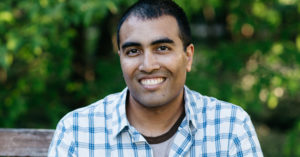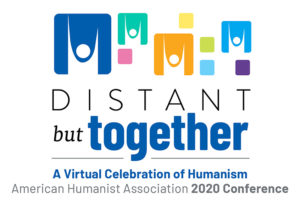Atheists in Public Office: An Interview with Hemant Mehta

The American Humanist Association (AHA) is pleased to host Hemant Mehta as a speaker at its 79th Annual Conference, “Distant but Together: A Virtual Celebration of Humanism,” streaming live online on August 8, 2020. You won’t want to miss this exciting opportunity to hear from a variety of humanist, atheist, and nontheist speakers right in your own home.
Mehta is the editor of Friendly Atheist, appears on the Friendly Atheist Channel on YouTube, and co-hosts the Friendly Atheist Podcast. He is the author of two books, I Sold My Soul on eBay and The Young Atheist’s Survival Guide. He also edited the book Queer Disbelief. Mehta’s most recent project is the podcast The Supreme Court vs. Church/State Separation, which in its first season focuses on the history of the Pledge of Allegiance. He’s been featured on CNN, Fox News, and in the Wall Street Journal, and he’s served on the board of directors for Foundation Beyond Belief and the Secular Student Alliance.
Mehta’s session at the AHA’s 2020 conference will explore the importance of open atheists holding public office. He’ll dive deep into how open atheists get elected, why it matters that they’re atheists, and what we can learn from them to be more successful in the future.
I had the opportunity to ask Mehta about his experiences covering politics and religion and what conference attendees will learn from his presentation.
 Meredith Thompson: Did you grow up in a particular religious tradition? What was the experience like and when did you start identifying as nonreligious?
Meredith Thompson: Did you grow up in a particular religious tradition? What was the experience like and when did you start identifying as nonreligious?
Hemant Mehta: I grew up in the Jain faith, which is centered around non-violence. While I still agree with many of its philosophical principles, the beliefs in karma and other supernatural ideas stopped making sense to me once I was a teenager and it was a quick slide into atheism for me after that.
Thompson: You actively write articles on religion and politics for your blog, Friendly Atheist. What is something you’ve covered in the past several years that left a strong impression on you?
Mehta: It’s been fascinating to see a rise in the religious left — usually Christians with liberal social views. I always enjoy covering progressive Christians who really push back against conservative Christians who steer their faith in a harmful direction. I do the same thing myself, but it’s more meaningful when people within your community call you out. It’s also helped me realize that, right now in the US, political dogma is far more harmful than religious dogma, and it’s worth setting aside certain differences to work towards a common goal. It’s also been remarkable to see how broadly atheism has become accepted in mainstream culture. Even if the word has certain negative connotations, the idea of being nonreligious seems almost unremarkable, and that’s in large part because of people who have helped destigmatize it by coming out over the past two decades.
Thompson: Do you think public opinion is becoming more receptive to the nonreligious? How does it correlate with religious presence in politics?
Mehta: Absolutely. More Americans of all ages, but especially people under thirty, say they’re willing to vote for an open atheist in their party for president. And when you get to lower offices—city council, state representative, etc.—it becomes even less of a barrier. That’s not to say it’s true in all parts of the country, but if a politician tried to use a candidate’s atheism against her, at any level, I suspect it would be met with serious backlash.
That said, more than 90 percent of Congress is Christian, and we have a long way to go before our nation’s policies become as secular as the Constitution demands. We need more people in power who recognize that, regardless of their own faith background. The fact that there are a dozen members in the Congressional Freethought Caucus (even though only one is openly a humanist), and that roughly fifty state-level officials are openly nonreligious is a good start.
Thompson: How impactful do you think the formation of the Congressional Freethought Caucus has been?
Mehta: While the group’s existence is currently more symbolic than powerful, I think it’s important to recognize that 1) members of Congress have been willing to join it at all, and 2) their membership hasn’t hurt them politically. That almost certainly would not have been the case a decade ago. I would love to see the caucus do more to push back against religious intrusion in the government, but that begins by bringing more members into the fold. It shouldn’t be controversial to say religious freedom includes defending the nonreligious when they’re being persecuted around the world, that policies should be driven by evidence instead of religious thinking, and that Christians shouldn’t be allowed to discriminate when taxpayers are funding their work.
Thompson: Why is it important for humanists and atheists to work to get nontheists elected to office?
Mehta: It’s important, but not because we “win” anything by having atheists in office—I don’t need a member of Congress advocating atheism to the country. There are two obvious benefits, though. First, I would hope nonreligious politicians are more likely to promote evidence-based policies and humanist goals, like fighting for social justice, civil rights, universal health care, etc. (You don’t have to be nonreligious to promote those ideas, of course.) Second, it would help elevate the respect atheism gets in this country. Most famous atheists are famous precisely because they challenge religion, which isn’t endearing to believers. Depending on who we’re talking about, it may even lead to harsher stereotypes about all of us. But an atheist politician would, theoretically, be a prominent figure whose job is to help everyone. Consider the best politicians in the country—the ones who fight for whatever it is you believe. If that person also happens to be an atheist, it breaks through the stereotype that you need God to be good. It’s important to have that sort of representation, whether you’re Muslim, Hindu, gay, trans, or any other group that’s often bullied by the religious right. Being a politician (at any level) may be the most high-profile job we could have where our role is to make everyone else’s lives better. And if we’re doing it while also being an atheist, that helps all of us.
Thompson: How can the open atheists already in office help us be more successful in the future?
Mehta: I need them to be effective politicians, period. If they’re in the majority, they should do everything they can to pass progressive legislation. If they’re in the minority, they should fight for those issues whenever possible and raise awareness of them. Along the way, I hope they don’t hide their atheism. But if they’re good at their jobs, atheist activists will be able to do more in general because the stigma won’t be as burdensome.
Thompson: What are the biggest challenges you face in your career?
Mehta: I’ve been lucky that my challenges seem small in comparison to what others are facing. There’s always frustration with trying to make ends meet through online advertising as a blogger, but I would urge readers to support their favorite atheist creators by donating to their Patreon pages, watching their videos, reading what they write, listening to what they produce, and sharing your favorite content as much as you can. That makes a huge difference!
On the flip side, I have to thank conservative Christians for always supplying me with a steady stream of material.
Thompson: What do you hope our virtual conference attendees will take away from your talk?
Mehta: I hope they walk away realizing how far atheists have come in politics over the past two decades. And I also want them to realize they can run for office! (Seriously.)
Thompson: What else are you working on, and how can we learn more?
Mehta: This year, my focus outside my website has been creating more YouTube videos at youtube.com/friendlyatheist1. Watch and subscribe! 🙂 Last year, I released a podcast specifically about the history of the Pledge of Allegiance and the legal battles surrounding it. You can hear that at churchstateseparationpodcast.com.
Don’t miss Hemant Mehta’s session at the AHA’s “Distant but Together” virtual conference on August 8, 2020. Registration is free! To secure your spot today, go to conference.americanhumanist.org, and look for more speaker profiles in the coming weeks.
